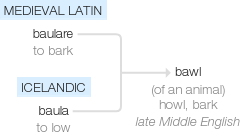Bawl
late Middle English (in the sense ‘(of an animal) howl, bark’): imitative; possibly related to medieval Latin baulare ‘to bark’ or Icelandic baula ‘to low’.
wiktionary
From Middle English bawlen, from Old Norse baula(“to low”) and/or Medieval Latin baulō(“to bark”), both from Proto-Germanic *bau-(“to roar”), from Proto-Indo-European *bau-(“to bark”), conflated with Proto-Germanic *bellaną, *ballijaną, *buljaną(“to shout, low, roar”), from Proto-Indo-European *bʰel-(“to sound, roar”). Cognate with Faroese belja(“to low”), Icelandic baula(“to moo, low”), Swedish böla(“to bellow, low”). More at bell.
etymonline
bawl (v.)
mid-15c., "to howl like a dog," from Old Norse baula "to low like a cow," and/or Medieval Latin baulare "to bark like a dog," both echoic. Meaning "to shout loudly" attested from 1590s. To bawl (someone) out "reprimand loudly" is 1908, American English. Related: Bawled; bawling.
